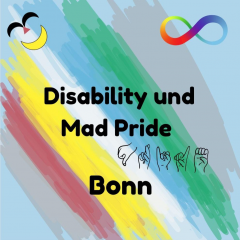We are going to explain some words we often use. As of now, it’s not written in Easy English. We want to change that in the future.
We call ourselves: Disability and Mad Pride Bonn.
Disability is not a bad word.
We thought about calling us “Crip Pride Bonn”. The term “crip” is even more radical than the term “disabled”. It’s a reclaimed version of the term “cripple”, an originally derogative term to refer to people with (physical) disabilities. The German term would be “Krüppel”. We decided against it as we don’t want to represent only those disabled people who are already activists and politically active.
The term “Mad” is being reclaimed as well. The same is true for the word “crazy”. Their original meaning is negative. It usually refers to people deemed “mentally ill” by society. Those people now reclaim it. They say: we are Mad and proud. They say: so-called mental illnesses are social constructs. Calling people mentally ill is a means to suppress undesirable people. It allows psychiatric oppression and mentalism.
The terms “mentalism” or “sanism” describe discrimination against psychiatric survivors, Mad, crazy and mentally ill people. Other neurodivergent people and people consuming illegalized substances experience mentalism, too. The term “mentalism” was coined by Judi Chamberlin, psychiatric survivor and part of the Mad and psychiatric survivor liberation movement. The term sanism was coined by the attorney Morton Birnbaum who worked as an ally.
We also use the term“mentally ill”. Not all people deemed to be mentally ill reject the concept and identify as Mad or crazy. We want to represent those people too. Especially taking into account that Mad Liberation Movements are not nearly as established in Europe as it is in the US and Canada.
We fight (against) ableism. Ableism describes discrimination against disabled, chronically ill, Mad, mentally ill, neurodivergent and Deaf people. We have coined an acronym for these groups, by the way, with is CIMND. It’s pronounced as the German term for cinnamon. Anyway, ableism tells us that all CIMND people lack abilities crucial for being part of society. Ableism tells us that CIMND people are less productive in a capitalist sense. According to ableism, that makes them unworthy of the same human rights as non CIMND people.
Neurodivergent people feel and think differently. They perceive the world differently. It’s a group consisting of many different people and subgroups, among them autistic people, people with ADHD and cognitive disabilities and Mad people.
For us, mentalism and audism are forms of ableism. Audism refers to discrimination against Deaf and or hard of hearing people. It’s based on the assumption that hearing is integral to being a human being. It’s also based on the oppression of sign languages.
We can’t fight ableism without fighting other systems of oppression, too. Dr. Kimberlé Crenshaw coined the term “intersectional” to describe how forms of discrimination intersect and they often manifest themselves in an interwoven way.
“None of us is free until all of us are free.”
Those most marginalised have to at the heart of any liberation movement. Which means for us: CIMND people who are also
- BI_PoC – that is Black, Indigenous and People of Color
- Migrants
- Roma
- Jewish
- FLINTA* – that is women (in German “Frauen”), lesbians, inter (intersex) non-binary, trans and agender people
- Queer / LGBTQIANP+
- Poor
- Homeless
- Sex workers
- Criminalised / incarcerated
- Institutionalised
LGBTQIANP+
We explain this acronym in more detail in our German dictionary. The letters stand for: Lesbians, gay, bi* (bigender, bisexual, biromantic), Trans, two-spirit, queer, inter, a* (agender, asexual, aromantic), non-binary, pan* (pangender, pansexual, panromantic) and other people whose gender, sexual and or romantic orientation does not obey social norms.
Criminalised
The term “criminalised” describes people who are persecuted as criminals. Marginalised people are so much more likely to be prosecuted than privileged people – with sex work, migration, drug use, homelessness and many other precarious forms of living being criminalised. In the book “Abolition. Feminism. Now.”, Angela Davis and her co-authors point out how the criminal “justice” system fails marginalised people. They also describe what a future without police and prisons could look like.
Institutionalised
That is people in institutions such as psychiatric clinics, prisons and places for disabled people where they both work (in so-called sheltered workshops) and live.

This is the Disability Pride flag: on a gray background with 5 crooked stripes in turquoise, blue, white, yellow and red.
– gray: in memory of the deceased and disabled people killed by the system
– turquoise: sensory impairments / Deafness
– blue: psychiatric disabilities / Madness
– white: Disabilities made invisible and undiagnosed
– yellow: neurodivergence and learning difficulties
– red: physical disabilities

Image description: That’s the Mad Pride flag designed by Sarafin for the Toronto Mad Pride. There are six stripes that alternate between dark purple and light purple. There is a face at the top right. The face has a large yellow mouth.
Source: Reale, Michael (April 19, 2013). “The design I’m going to test drive for Mad Pride 2013 – I think!”. Mad Pride Toronto Flag Campaign

Image description: That’s the Autistic Pride Flag. Many autistic people say: We are autistic and proud. The flag has 5 stripes: red, orange, yellow, light green and dark green. The yellow stripe is very wide. A lying 8 can be seen on the strip. This is the symbol for infinity. The symbol also represents neurodivergence and autism.

This is the Deaf Pride Flag. Many Deaf people and signers say: We are Deaf and proud. We communicate in sign language and are proud of it. The background is dark blue. In front of it is a turquoise hand. The hand has a yellow border. Arnaud Balard designed the flag.
Source: https://www.taubenschlag.de/2023/07/der-flaggendesign-von-arnaud-balard-ist-jetzt-die-officiale-taube-flagge/
Sources: https://www.cripriot.com/post/disabled-insane-crip-the-power-of-reclamation
